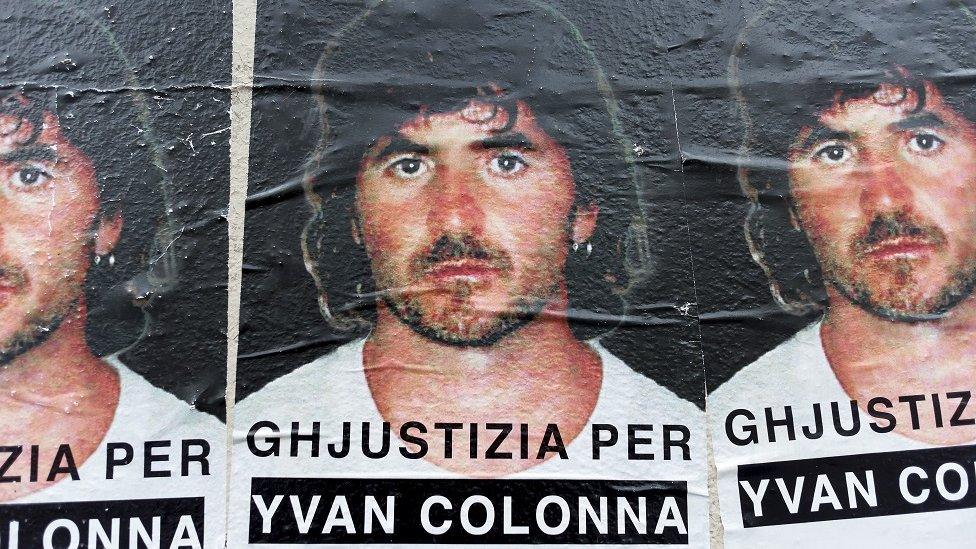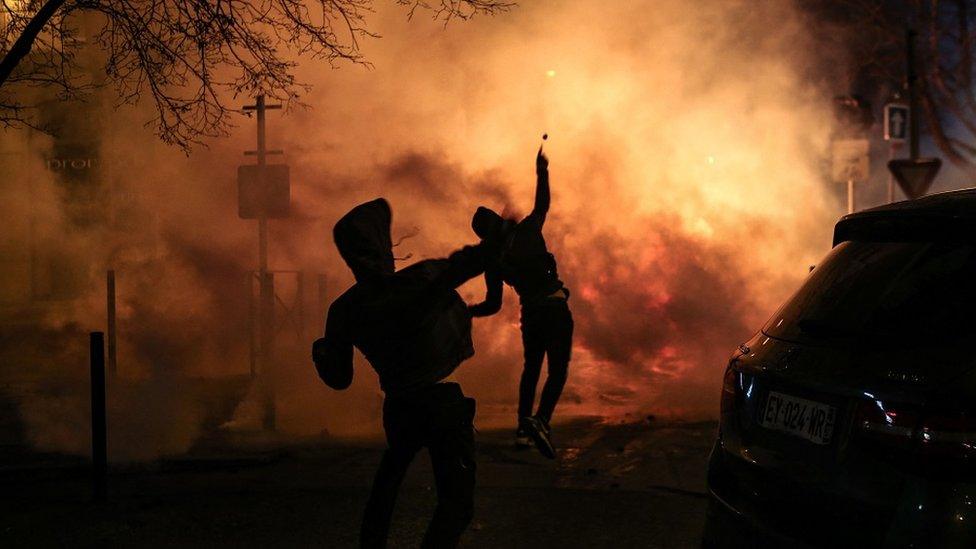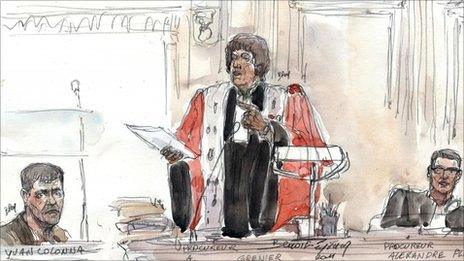Yvan Colonna: Corsican nationalist dies after jihadist jail attack
- Published

Yvan Colonna's attack has prompted protests in France and Corsica
A jailed Corsican nationalist, whose prison assault sparked protests on the French Mediterranean island, has died.
Yvan Colonna, 61, who was serving a life term for murdering Corsica's top official, was beaten by another inmate, a Cameroonian jihadist, on 2 March.
The attack left Colonna in a coma and he had been receiving treatment in a hospital in the south of France.
The assault provoked riots in Corsica, where many see him as a hero in its campaign for independence from France.
Colonna was jailed two decades ago for shooting dead, external Corsica's prefect Claude Erignac in 1998, following a five-year manhunt that eventually found him in the mountains living as a shepherd.
Colonna, who was one of France's best-known prisoners, died in a hospital in the southern French city of Marseille. His supporters had long campaigned for his release or his transfer to jail in Corsica.
According to prosecutors, he was working out in the prison gym in Arles when Franck Elong Abé, 35, a former jihadist serving time for terror offences, allegedly launched his attack.
For eight minutes, Abé beat Colonna and tried to suffocate him with a bin bag and towels, investigators say. Under questioning, he accused Colonna of "blaspheming" and mocking the prophet Muhammad.
The assault - and the perceived failure of prison authorities to prevent it - stoked anger on the island, prompting its biggest and most violent protests in decades.
The unrest prompted the French government to suggest it could loosen its grip on the island.
French Interior Minister Gérald Darmanin said Paris could offer Corsica "autonomy" and visited the island last week, while President Emmanuel Macron conceded that idea was no longer "taboo".

Protesters threw petrol bombs and stones at police officers in Corsica's second-biggest city Bastia
For more than 10 days, protesters took to the streets, chanting "Liberta" (freedom) and "Statu Francese assassinu" (French state assassin). Some lobbed stones and petrol bombs at police.
In a single night of rioting in Corsica's second-biggest city, Bastia, on 13 March, some 67 people were injured, 44 of them police officers.

Corsica's future becomes election issue

The agonising death of Yvan Colonna has put Corsica's troubles at the centre of the political agenda, less than three weeks ahead of France's presidential election.
Convicted assassin he may have been, but the 61-year-old had heroic status among the island's nationalists. Many of them refuse to believe he was actually guilty of killing Claude Erignac in 1998. He always denied it.
But many more were horrified by the manner of his death, brutally suffocated in a prison gym by a jihadist co-detainee. They blame the French state for failing to protect him, especially after Paris refused for years to have him transferred from the mainland to a jail inside Corsica.
Faced by serious rioting on the island, President Macron's reaction so far has been conciliate, conciliate, conciliate. Two others convicted in the Erignac killing have been told they can now be transferred back to Corsica. And last week's promise of "autonomy" talks was a significant concession to nationalists.
The danger, as Le Monde points out in an editorial, is that it all comes across as a signal of weakness. For years, President Macron has refused to budge on constitutional change for Corsica - and now, suddenly, under the pressure of violence, he gives way.
The same happened after the "yellow vests" protests led to the opening of state coffers. A dangerous precedent, perhaps, especially if, as many predict, the president is re-elected "by default" next month: in the shadow of the Ukraine war, with a low turnout and an underperforming opposition.

Talks on autonomy are due to start early next month, but Colonna's death prompted shock across the political spectrum.
Corsica's pro-autonomy regional council president, Gilles Simeoni, said his death was an "injustice and a tragedy, which will leave its mark on the history of contemporary Corsica and its people".
The island - most famous for being the birthplace of Napoleon Bonaparte - has been a French territory since the 18th Century. But its recent past has been marked by separatist violence.
"I call on everyone to keep their calm and not add fuel to the fire in Corsica," said the Republicans' presidential candidate Valérie Pécresse.
A spokesman for far-right candidate Eric Zemmour said Colonna's jihadist killer should have been deported long ago.
- Published21 June 2011

- Published30 June 2010
- Published25 July 2023
